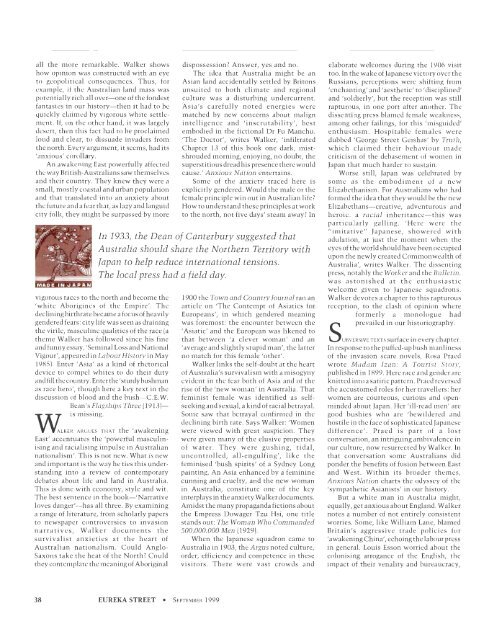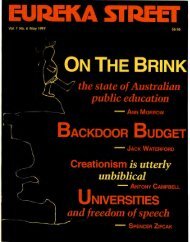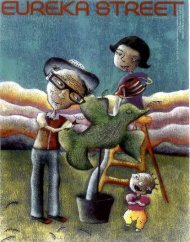all the more remarkable. Walker showshow opinion was constructed with an eyeto geopolitical consequences. Thus, forexample, if the Australian land mass waspotentially rich all over-one of the fondestfantasies in our history-then it had to bequickly claimed by vigorous white settlement.If, on the other hand, it was largelydesert, then this fact had to be proclaimedloud and clear, to dissuade invaders fromthe north. Every argun"lent, it seems, had its'anxious' corollary.An awakening East powerfully affectedthe way British-Australians saw themselvesand their country. They knew they were asmall, mostly coastal and urban populationand that translated into an anxiety aboutthe future and a fear that, as lazy and languidcity folk, they might be surpassed by moredispossession/ Answer, yes and no.The idea that Australia might be anAsian land accidentally settled by Britonsunsuited to both climate and regionalculture was a disturbing undercurrent.Asia's carefully noted energies w erematched by new concerns about malignintelligence and 'inscrutability', bestembodied in the fictional Dr Fu Manchu.'The Doctor', writes Walker, 'infiltratedChapter 13 of this book one dark, mistshroudedmorning, enjoying, no doubt, thesuperstitious dread his presence there wouldcause.' Anxious Nation entertains.Some of the anxiety traced here isexplicitly gendered. Would the male or thefemale principle win out in Australian life?How to understand these principles at workto the north, not five days' steam away? InIn 1933, the Dean of Canterbury suggested thatAustralia should share the Northern Territory withJapan to help reduce international tensions.The local press had a field day.vigorous races to the north and become the'white Aborigines of the Empire' . Thedeclining birthrate became a focus of heavilygendered fears: city life was seen as drainingthe virile, masculine qualities of the race (atheme Walker has followed since his fineand funny essay, 'Seminal Loss and NationalVigour', appeared in Labour History in May1985). Enter 'Asia' as a kind of rhetoricaldevice to compel whites to do their dutyand fill the country. Enter the' sturdy buslunanas race hero', though here a key text in thediscussion of blood and the bush-C.E.W.Bean's Flagships Three ( 1913)-"'{ X T is missing.V VALKER ARGUES THAT the 'awakeningEast' accentuates the 'powerful masculinisingand racialising impulse in Australiannationalism'. This is not new. What is newand important is the way he ties this understandinginto a review of contemporarydebates about life and land in Australia.This is done with economy, style and wit.The best sentence in the book-'Narrativeloves danger'-has all three. By examininga range of literature, from scholarly papersto newspaper controversies to invasionnarratives, Wa lker documents thes urvivalist anxieties at the heart ofAustralian nationalism. Could AngloSaxons take the heat of the North? Couldthey contemplate the meaning of Aboriginal1900 the Town and Country Journal ran anarticle on 'The Contempt of Asiatics forEuropeans', in which gendered m eaningwas foremost: the encounter between the'Asiatic' and the European was likened tothat between 'a clever woman' and an'average and slightly stupid man', the latterno match for this female 'other'.Walker links the self-doubt at the heartof Australia's survivalism with a m isogynyevident in the fear both of Asia and of therise of the 'new woman' in Australia. Thatfeminist female was identified as selfseekingand sexual, a kind of racial betrayal.Some saw that betrayal confirmed in thedeclining birth rate. Says Walker: 'Womenwere viewed with great suspicion. Theywere given many of the elusive propertiesof water. They were gushing, tidal,uncontrolled, all-engulfing', like thefeminised 'bush spirits' of a Sydney Longpainting. An Asia enhanced by a femininecunning and cruelty, and the new womanin Australia, constitute one of the keyinterplays in the anxiety Walker documents.Amidst the many propaganda fictions aboutthe Empress Dowager Tzu Hsi, one titlestands out: The Woman Who Commanded500,000,000 Men (1929).When the Japanese squadron came toAustralia in 1903, the Argus noted culture,order, efficiency and competence in thesevisitors. There were vast crowds andelaborate welcomes during the 1906 visittoo. In the wake of Japanese victory over theRussians, perceptions were shifting from'enchanting' and 'aesthetic' to 'disciplined'and 'soldierly', but the reception was stillrapturous, in one port after another. Thedissenting press blamed female weakness,among other failings, for this 'misguided'enthusiasm. Hospitable females weredubbed 'George <strong>Street</strong> Geishas' by Truth,which claimed their behaviour madecriticism of the debasement of wom en inJapan that much harder to sustain.Worse still, Japan was celebrated bysome as the embodiment of a newElizabethanism. For Australians who hadformed the idea that they would be the newElizabethans-creative, adventurous andh eroic, a racial inheritance-this wasparticularly galling. 'Here were the"imitative" Japanese, sh owered withadulation, at just the moment when theeyes of the world should have been occupiedupon the newly created Commonwealth ofAustralia', writes Walker. The dissentingpress, notably the Worl
and the loss of Asia as a colourful spectaclefor travellers like himself. N eedless to say,he despised W.H. Fitchett, the great late19th-century imperialist propagandist. Butthe greatest concern was focused on British'racial appeasem ent' as manifested in the1894 trade treaty with Japan and theimplications for a white Australia. Whatabout building trade with 'natural allies'?There was the suspicion that England sawthe White Australia policy, and its colonialprecedents, as national selfishness. In 1933,the Dean of Canterbury suggested that Australiashould share the Northern Territorywith Japan to h elp reduce internationaltensions. The local press had a fi eld day.Great anxiety fuelled plenty of crackpotthinking about the land. H ot climatesbecam e a worry. Sir Charles Dilkedenounced the 'labour-saving banana' asthe 'curse of the tropics'. Australiansworried about the problem s of 'languor' and'tropical neurasthenia' were not so sureabout the banana. On the other hand,Randolph Bedford was certain about thecarryin g capacity of dry country-h echallenged anyone who doubted it to golook at the green grass on Kalgoorlie's racecourse.H e said Lake Eyre could be theworld's greatest rice field. (Atomic idealistsafter World War II made similar claimsabout the multifarious benefits of nuclearpower, so we cannot be too hard on Bedford.)Dr Richard Arthur campaigned to fill thenorth with good white citizens. He told theeditor of the Australian World in London:'never a word about the Yellow Peril, orSocialism or strikes. And print everythingyou can lay your hands on to the detrimentof Canada.' H ow m any scheming lies canwe put down to 'anxiety'?In Walker's book, crackpot opinions andbig fibs are contextualised. They figured indialogues, driven by both fear and reason,which som ehow advanced our collectiveunderstanding of the land and ourselves. Bythe mid 1930s, the remarkable GriffithT aylor, speaking for 'scientific inquiry'against ignorant bombast from the likes ofBedford, had helped to shift the debatearound ' Australia Unlimited' fantasies to am ore sober estimate of Australia's diverseenvironments and the skills needed to settlepeople in them . Concerns about environmentaldegradation also played a part.Walker links the controversy that doggedGriffith Taylor's career to his insistencethat Australia had a classic Oriental desertat its very heart. The Orien tal associationsof 'desert' were an affront to his opponents,intent as they were on redeeming thewilderness, not herding camels or becomingArabs.A new problem followed from thecontroversy which the name Griffith Taylorsignified. The limits to Australia's carryingcapacity m eant that Australians had to thinkof new ways to keep Asia in Asia. While theGreat War refuelled fears of race debilitation,environmental realities shifted som ethinking from anxious speculation and itsmad schem es towards an understanding ofneeds in Asia and how they might be m et.Walker resurrects som e great moments. In1923, Griffith T aylor walked into the lion'sden: h e addressed a m eeting of the SydneyMillions Club. He challenged the stupidityof racial purism with a favourite party trick,showing the unhappy audience a slide ofRobert Louis Stevenson standing beside hisSamoan cook. He argued that, by ethnologicalstandards, 'the cook was a moreintellectual type than the famous author ofTreasure Island.' He called for 'accommodation'with the East, for inter-marriageof Australians and Mongolians (whom headmired) and thus a phasing out of WhiteAustralia.The strength of feeling against racialinter-marriage was r efl ected in popularfiction and films about doomed inter-raciallove. The idea of moving closer to Asia didnot win out. Even in commerce, whereopportunity beckoned, industrialists andm arketers seemed half-hearted. In a chaptercalled 'Money For Jam', Walker quotes aEuropean manager in Tsien tsin who wouldnot sell Australian jam to the Chinesebecause the tins looked so alarming. Theu se of icons in labelling was careless:' Asianconsumers often assum ed they were beingoffered tinned koala or platypus, delicaciesfor which they were unprepared.' AnxiousNation shifts from the realm of culture tothe world of trade and back again andconcludes with a chapter on the Institute ofPacific Relations, an organisation whichwas ahead of its time, well-informed onAsia and driven by a desire for understandingand accommodation. In the Cold War, asubject for the next volume, the IPR wassavaged.Walker is an editor of the AnnotatedBibliography of Australian Overseas TravelWriting (1996), so it is no surprise to findthat traveller's books provide a good bit ofthe scaffolding in this study, albeit interlacedwith literature on land, population,climatology and so on. My gripes are fewgiven the achievement here, but I do wonderwhether the reliance on travel writingthroughout Anxious Nation makes for som eproblems. In the case of the Indian mutiny,for example, commentary is drawn frombooks, mostly travel tom es, which appearedseveral decades after the event. In Sydney atthe time, there was open debate aboutBritish misrule and cruelty, and at least oneappeal to the ladies of England to comm endm ercy to their m en. Walker m erely quotesthe Argus on the 'ferociou s cruelty' of theIndians. What's missing is the contemporarymilieu, notably a colonial ambivalencetowards the British, which influencedd eb a t e ab out events in India . Thatambivalence h as a his tory fire d byexperience in other parts of Asia too,something which is acknowledged.Walker has mapped out an entire fieldand shifted the discussion of our relationshipwith multiple Asias nearer to the centreof historical debate. In diving parlance, thedegree of difficulty in his project is high. It'a triple som ersault with twist, pike, and atravel book under each arm. It is a greatcontribution to a 'commitment of the mind'to a future with or in Asia. Whichpreposition will it be?•Peter Cochrane is a freelance historian basedin Sydney.("l.1W/1-j :J ~\0Embracing the World:Women, Spiritualityand ChurchA conference exploring anthropology,sacratnentality, and a churchfit for women.O ctober 1-3, 199913urgmann Coll ege, ANUCanberra, AC TKeynote speaker: Elfriede HarthSpokesperson for the InternationalMovem ent W e are C hurch (IM WAC)spea king on 'Crea ting a Just C hurch'.Other spea kers in clude: Veronica Brady,M orag Fraser, Mari e Joyce,H ea th er Tho mso n, M ari e Louise Uhr.Brochures & Conference details from:Ordination of Catholic Women Inc.PO 13ox E41 8, Kin gsto n ACT 26 (J.thomepage: www. netconn ect. com. au I -ocwphone enquiries (02) 6251 45 13V o LUME 9 N uMBER 7 • EUREKA STREET 39
















